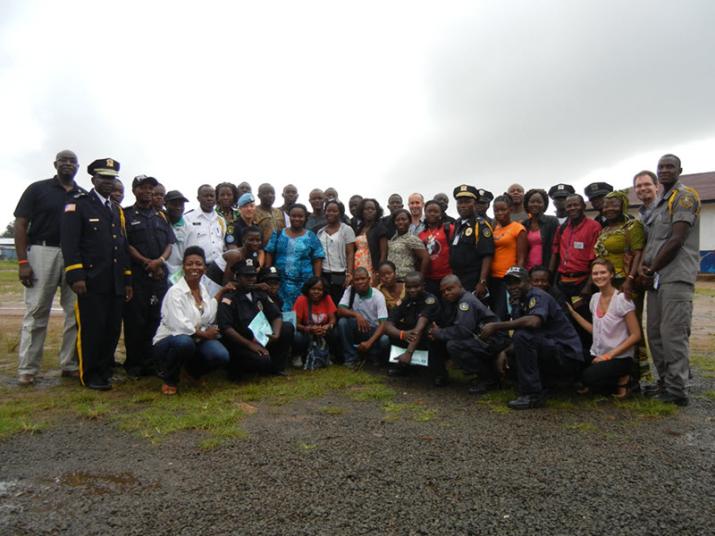
Liberia National Police Training Academy and The Carter Center Mental Health Program collaborative training workshop, Paynesville, Liberia (August 2013)
Published March 3, 2015 under Research News
A recent study led by Brandon Kohrt, professor of global health, psychiatry, and cultural anthropology, suggests that collaboration among law enforcement officers and mental health clinicians can help reduce stigma and police violence against persons with mental illness in Liberia. The collaboration model developed through this project also proved applicable in addressing challenges law enforcement officers encountered during the Ebola outbreak.
Kohrt and his research team spearheaded efforts to create a model for law enforcement and mental health personnel to partner in meeting the needs and protecting the human rights of mentally ill individuals. A key component of this model was the development of a training curriculum for law enforcement officers.
Laying the Groundwork for Collaboration
The Carter Center Mental Health Program (TCC-MHP), which funded this project, has been working for about five years with the Liberian government and various community stakeholders to provide anti-stigma, family support, and advocacy initiatives to help fulfill the goals of Liberia’s 2010 National Mental Health Strategic Plan.
As part of this work, TCC-MHP engaged leaders in the Liberia National Police (LNP) to identify avenues for collaboration between law enforcement and mental health. The LNP embraced this opportunity as part of their ongoing quality improvement efforts, and they selected the National Police Training Academy (NPTA) as the primary institution to partner with the mental health field.
Developing a Context-Sensitive Curriculum to Foster Collaboration
In the absence of an existing model for collaboration between law enforcement and mental health in post-conflict low-income settings, the Liberian staff of TCC-MHP and the NPTA decided to use Crisis Intervention Team (CIT) as a framework from which to develop a Liberia-specific collaboration model.
CIT, an evidence-based police training program that has been implemented widely in the United States for 25 years, is designed to improve the safety of both officers and people with psychiatric illnesses, reduce stigma, and promote the use of de-escalation techniques.
In collaboration with the research team, law enforcement officers and mental health clinicians worked together to adapt CIT to meet the needs of the Liberian community. Key steps in this process included:
- Interviews with mental health clinicians, mental health service users and their caregivers, and law enforcement officers. These interviews provided insight on what factors contribute to or get in the way of positive outcomes for mental health service users in the criminal justice system.
- Three-day workshop designed by TCC-MHP staff and CIT experts to facilitate collaboration and curriculum development. Participants included representatives from law enforcement, mental health clinicians, and mental health service users, and the goal was to identify training needs, propose solutions, and begin designing the curriculum.
- Needs assessment developed by the research team based on interviews and CIT curriculum elements. The assessment was administered on the first day of the workshop to help officers and mental health clinicians identify key problems and priority areas that would inform curriculum topics.
The curriculum they developed, “Liberia Mental Health Crisis Intervention Team,” focuses on three classes of mental disorders deemed to be the most relevant: substance abuse, psychosis, and trauma/post-traumatic stress disorder. It also addresses epilepsy because of the widespread stigma against and myths about epilepsy in Liberia. Additionally, the program includes a site visit to a mental health treatment facility and information about Liberian legal policies and United Nations conventions.
Seeing the Benefits of Collaboration
Assessments administered before and after the workshop revealed a significant increase in knowledge among law enforcement officers, a significant decrease in social distance (unwillingness to associate with individuals with mental illness) among officers, and a significant increase in positive attitudes for both mental health clinicians and officers.
In addition, six months after the workshop, more than two-thirds of mental health clinicians reported ongoing engagement with law enforcement, including collaborations that had not been occurring prior to the workshop (e.g., an officer coordinated with a clinician to take a suicidal person to a health facility instead of jail).
In the fall and summer of 2014, security forces and mental health workers began partnering in similar ways to address the needs of individuals with Ebola and their families, demonstrating that the benefits of collaboration among these groups extend beyond the protection of individuals with mental illness.
“We knew that this work was crucial to improve the lives of people with mental illness in Liberia. What we couldn’t anticipate was that this work would play an important role during the Ebola outbreak,” Kohrt reflected. “Skills in verbal de-escalation and psychological first aid made mental health clinicians and CIT-trained police invaluable in the Ebola treatment units. The project exemplified how strengthening mental health systems and collaborations has far-reaching population-wide benefits.”
To learn more about the study, read the full article, “Adapting the Crisis Intervention Team (CIT) Model of Police–Mental Health Collaboration in a Low-Income, Post-Conflict Country: Curriculum Development in Liberia, West Africa.”
Authors include Brandon Kohrt, MD, PhD, Elise Blasingame, MSW, Michael T. Compton, MD, MPH, Samuel Dakana, Benedict Dossen, Frank Lang, Patricia Strode and Janice Cooper, PhD.


